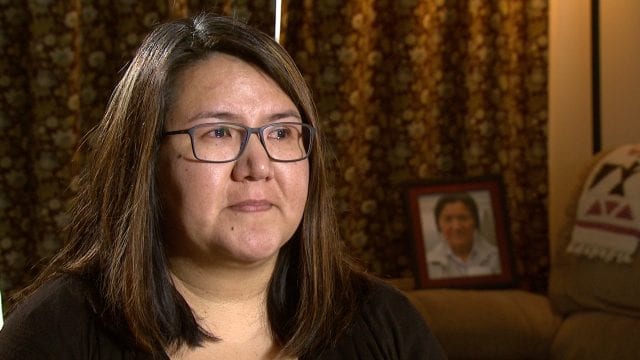
A promise to a dying mother is one a daughter has to keep.
For Samantha Peters, her promise would be more of a stand against the most powerful in her family.
But the Peters are no ordinary family. They have their own reserve — Peters First Nation in British Columbia.
It’s a reserve with 12 homes tucked below the mountains along the Fraser River about two hours east of Vancouver on the TransCanada Highway.
The band office, on Peters Road, has been controlled by one side of the Peters family for 30 years.
Indigenous Affairs recognizes 165 people with status through the band, but only 42 are members who can vote in elections.
People keep getting denied or ignored when they apply for membership to the band even though their status card says Peters.
It’s left Peters divided, just not evenly.
Samantha Peters, 41, was asked by her mom to even it.
Before she died, she made her daughter promise to end the reign — never mind family ties, those had been severed years ago.
“You have to do something about it,” Roberta Peters told her daughter. “You have to promise me that you’re going to do something.”
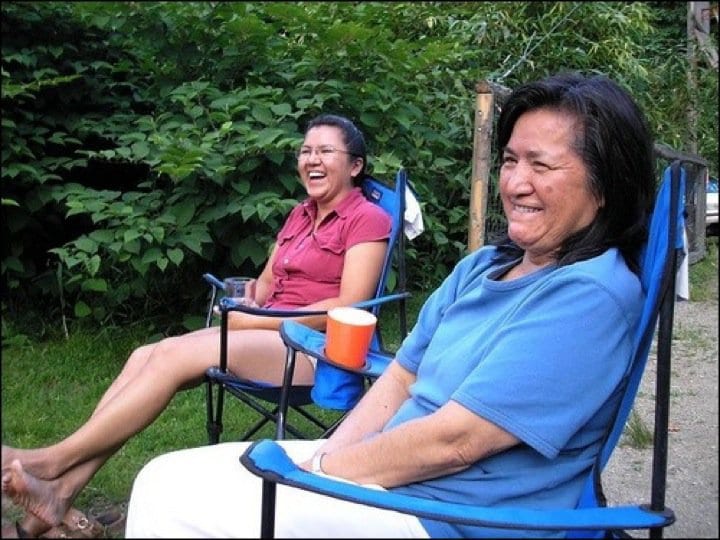
Roberta was passing the burden and challenge on to her daughter, as she herself had fought so long to fix the membership issue.
Roberta knew she was dying. She had terminal lung cancer and would die later in that summer of 2010. She was 66.
APTN National News has reviewed over 60 cases of people who have been given status through Indigenous Affairs but the band has so far refused to accept them.
Close to a dozen of them have been interviewed, each with their own story but a similar trend — they are status Indians and don’t belong to a band.
“It just got to be greed,” said Ed Peters, 74, the eldest member of Peters, and Samantha’s uncle. “They (the chief and council) want to keep membership the way it is so they got control. We don’t have a chance against them.”
It was basically set up that way by the federal government.
Peters is what’s known as a Section 10 band, meaning it decides who is a member, not Indigenous Affairs.
They’re one of about 230 First Nations in Canada with that authority.
They got that power in 1987 after Bill C-31 came into effect under the former Conservative government of Brian Mulroney.
That’s when the courts ruled that women, and their descendants, who previously lost their status for marrying a non-status person, could have it back.
It resulted in a flood of people applying for status, so Indian Affairs, as it was called then, also amended the Indian Act as part of the bill allowing for bands to self-govern their membership, as long as the minister approved a membership code.
It was a comprise by Canada and some groups, like the Assembly of First Nations, opposed Bill C-31.
But it left little recourse or appeal for those who felt a band was unfairly denying them membership.
There are several cases where people have been told by Indigenous Affairs that the band has “exclusive control” over membership and that recourse to appeal is through the Federal Court — if the person can afford to hire a lawyer.
“The government washed their hands of it,” said Samantha Peters.
Peters felt the effect immediately.
The chief at the time, the late Frank Peters, removed 28 people from the membership list in 1987 — individuals who had been approved by Indian Affairs.
Since then, the membership list has been kept small with one side of Peters always having more votes than the other to determine elections and to stay in power on the small reserve. All the while, Indigenous Affairs keeps adding status Indians through the band.
When Samantha Peters made the promise to her mother, she was also making it to her grandmother, Minnie Peters, who also passed away in 2010.
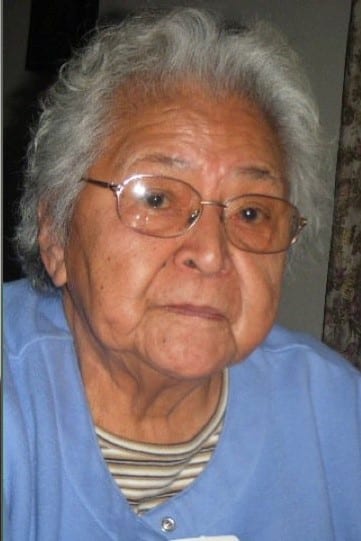
Minnie Peters had tried years earlier to get Ottawa to see its mistake with what she called flawed legislation.
“I am writing to you as my last resort,” she wrote the former Indian Affairs minister Pierre Cadieux on Jan. 4, 1990, less than three years after Peters became a Section 10 band. “Bill C-31 has unfortunately provided the opportunity through Section 10 for what is a virtual dictatorship to become a legal and permanent entity.”
She went on to say, “the chief is accountable to no one and can maintain his power through intimidation, the control of information and the manipulation of resources.”
In her letter, Minnie Peters outlined how the chief was then able to quickly put a stranglehold on the reserve, alleging he didn’t hold council meetings, gave his daughter membership even though she had married a “non-Indian” years before C-31, while refusing to accept other C-31 applicants, including elders who wanted to return home, and his son had a new home while other members lived in derelict housing.
She asked Cadieux to investigate and respond to her letter, but not in “some kind of legalistic response telling us this dictatorship, established by the department and perpetuated by imperfect legislation and regulations, is self government.”
She called on him to develop some sort of legal recourse through the government to protect the human rights of all band members.
Minnie Peters got a response from the minister, who was now Tom Siddon, declining to help and reminding her that there was an election coming up soon on Peters.
“Certainly it will give the band electorate an opportunity to choose a new chief and council if they are unhappy with the current state of affairs,” Siddon wrote on April 17, 1990.
He completely missed the point, according to Samantha Peters.
“The minister’s response was shallow,” she said.
The chief had the votes to keep his side in power and it would be an election that her grandmother’s side would ultimately lose, and has continued to lose until this day.
Soon after her mother died, Samantha Peters began looking into how to fix the membership issue. When she started out she thought it just involved her family that lived on the reserve.
Then she found old band lists dating back to the early 1900s and realized it wasn’t just her family but dozens of others scattered all over the Fraser Valley. They all were descendants of Peters and, like Samantha, Tait Indians, meaning “those up river.”
Some were off reserve just up the highway or in nearby cities like Chilliwack.
She gathered 66 names over a two-year period and filed their applications at the band office believing they all met the membership code.
Not a single applicant was approved for membership, including Carol Raymond.
Raymond’s father, Joseph Lorenzetto, is buried in the cemetery on Peters, as are her grandparents, who were all once members of the band.
Raymond, 74, was a Bill C-31 applicant and she walked into the band office one day explaining to them who her father was and how she was part of the Peters family.
They didn’t know the Lorenzetto name but her story could have been confirmed walking over to the cemetery.
“If I am only recognized as who I am, that has always been my thing. They can scratch you off but why can’t they turn it around and …,” said Raymond breaking down in tears.
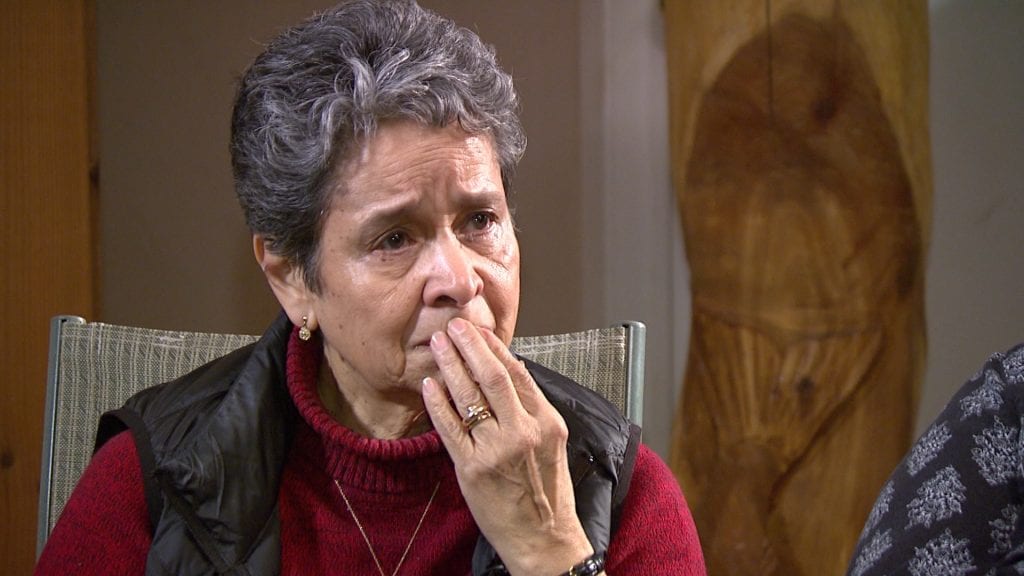
She said just because she married a non-status person doesn’t mean the colour of her skin changed.
“My colour never, ever changed. I was born this way,” she said.
She said the band ignored her application. She has since filed a second application and at a recent meeting with council she was asked if she was looking for money and land.
“I just want to be accepted,” said Raymond.
Others were transfers from other bands, like Ed Peters’ wife and children.
But the band would argue it didn’t accept transfers, something that is not stipulated in the membership code.
To this day, his family are not members of the band even though he is their oldest elder.
“With our membership code, it says as long as you are the natural child of a band member you are entitled to be a member of the band. You are eligible and you are entitled. It’s that simple,” said Samantha Peters. “People are not recognized and people are not treated equally.”
Guy Peters, 51, is Samantha’s first cousin, and a sand blaster by trade. His father, Robert Peters, is a member and lives on the reserve.
Robert, the second oldest elder and Ed’s brother, would like to pass land on to his son but first Guy needs to become a member.
“It feels weird to have a status card and not belong anywhere,” said Guy recently in an interview with APTN. “How can a guy have a status card when he is supposed to be from a band and they don’t accept you?”
He said it makes him feel like an outsider on the very land his people come from and the river they’ve fished salmon from for generations.
But Guy Peters believes he knows why he has been refused membership three times since the early 1990s, four if you count the time Frank Peters removed his name off the band list in 1987.
He was most recently denied last July.
“I think it has a lot do with the voting. They were scared they would get voted off for what they are now. It all has to do with being chief and council around here,” he said.
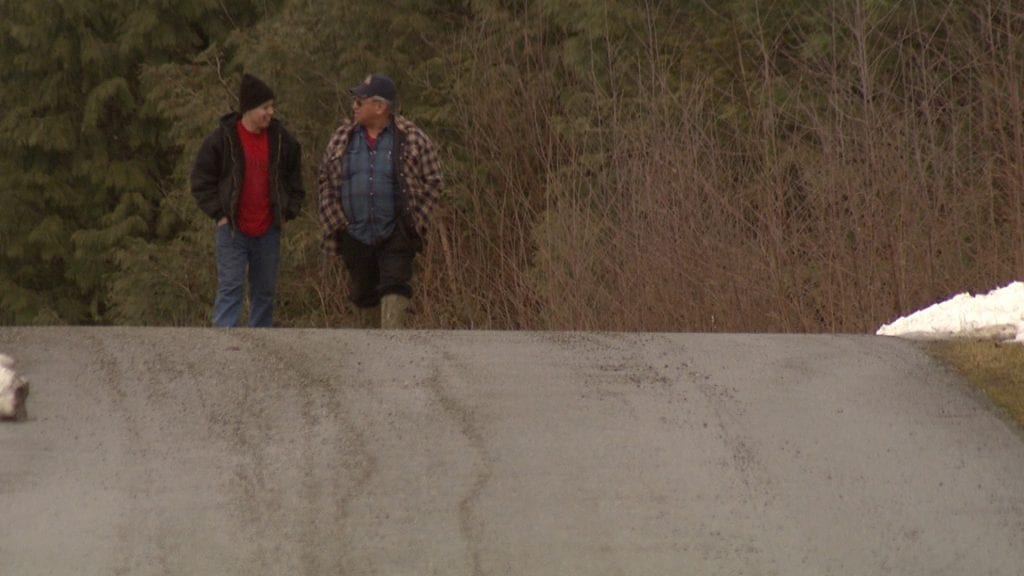
When he was denied again last summer the chief and council wrote saying he wasn’t “entitled” to membership.
“I don’t know how they can live with themselves to be like that … we’re all related here. We’re all cousins and don’t even get along,” he said.
He wasn’t the only applicant denied that month. His brother’s two children were as well. Amber Ragan and Brandon Engstrom were denied despite their father Robert Dwayne Peters being a member.
Engstrom also claims to have been a member but when he became old enough to vote he said the band removed him.
“If they had me and Amber and Brandon vote they (chief and council) would lose their votes. It’s that close,” said Guy Peters.
The last election, just in January, was closer than it’s ever been. The two councillor positions were decided by two votes and chief with a margin of four ballots.
Samantha Peters, and her longtime partner Darryl Kipp, saw the membership rejections coming and had already reached out to Indigenous Affairs calling for an investigation in what she called a chronic human rights issue.
In one such meeting with Indigenous Affairs on June 10, 2016, they were told when it came to the membership issue there was little the government could do and they were probably best to pursue the matter in Federal Court.
“When a band takes its own membership under its own control, we’re essentially out of the equation,” said Randy Jenkins, a senior analyst with Indigenous Affairs in Ottawa.
That meeting was audio recorded and a copy of the tape was provided to APTN.
But Samantha Peters reminded Jenkins that she believed Minister Carolyn Bennett had authority under the Indian Act to make orders.
“That is something that we feel that you folks really need to do,” she told Jenkins. “You know, the band will continue to treat members of the community this way until they’re challenged. They’ve got the membership list rigged to its fullest extent right now, so they will continue to rig that system and accept federal dollars to support their financial lifestyle, you know, until the government challenges them on it.”
Jenkins responded he had become intrigued by what was happening at Peters.
“I’ve got to tell you, quite frankly, the standard response to this is that we’re not involved in that level of administration,” he said. “So, rather than giving you a ‘no’, like I probably should outright, I’m actually going to do the work on this. And, I can tell you it’s not an easy fight, but, I mean, you’ve captured us this far, so we’re willing to commit the effort to it. You just have to be patient until we get through that.”
Jenkins vowed to review all documents the department had on Peters’ membership and pass the information to his managers.
“We’ll have to put together a position on this and then brief up on it. So, that’s the piece that’s going to take a while.”
It has taken a while.
In fact, there hasn’t been a resolution to date and it’s not known if Samantha Peters’ complaint ever made its way through Indigenous Affairs.
When she started getting less and less information from Jenkins she decided to pay, out of her own pocket, for a lawyer to file for a judicial review in Federal Court over the membership rejections of Guy, Brandon and Amber in December.
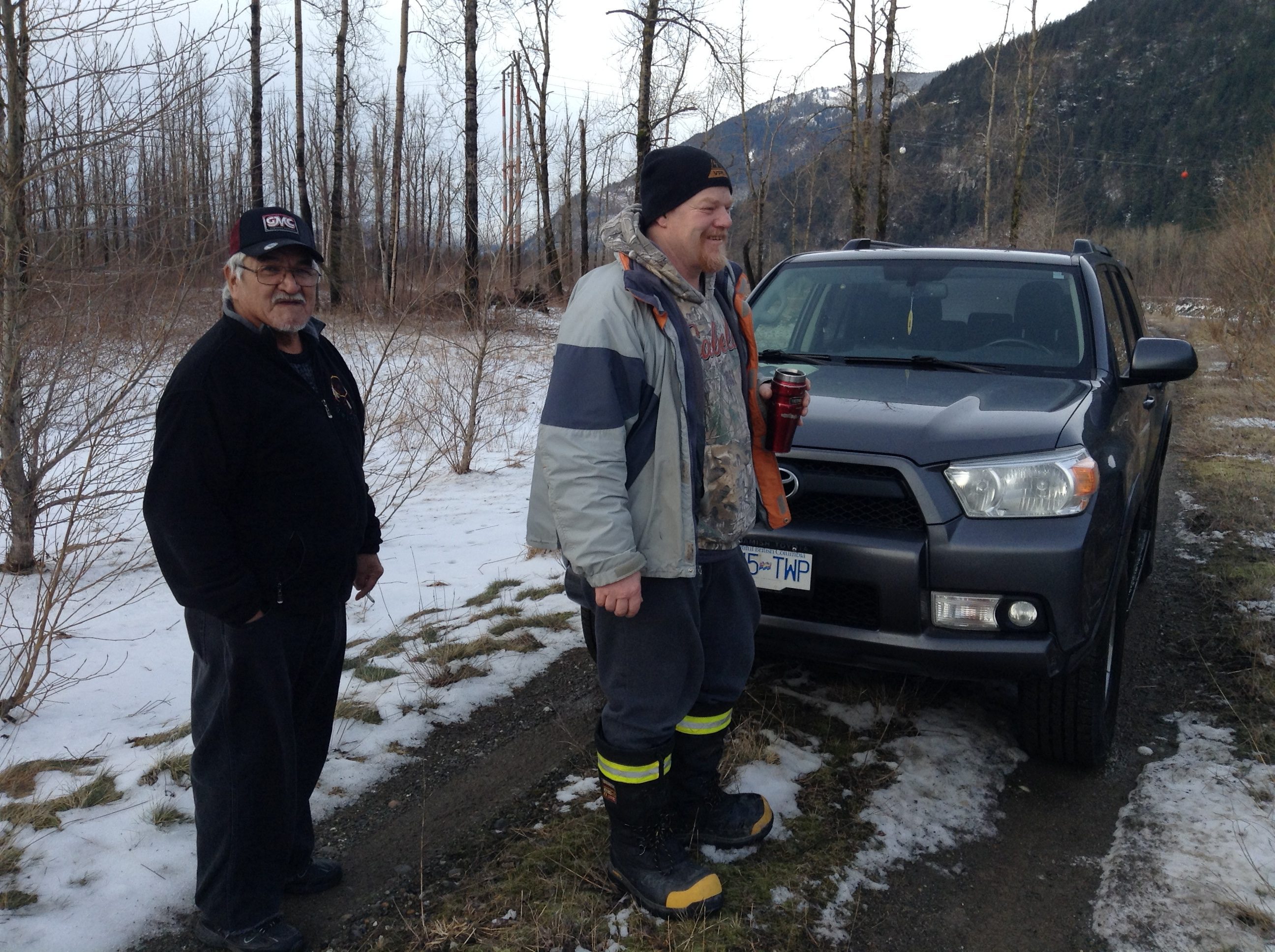
Kipp had already been representing the three at band council meetings trying to convince Chief Norma Webb and her two councillors they deserved to be members.
In his research, Kipp compiled extensive research into the history of Peters First Nation and his three clients.
That has been filed as an exhibit in Federal Court. The documents have been reviewed by APTN and make up portions of this story.
“They each deserve to be members here and we think the Federal Court is going to agree,” said Kipp. “I just kind of hope that at the bottom of all that we are doing here for Peters that we actually expose something that changes policy … I think that’s what (Roberta) and (Minnie) wanted.”
The Federal Court has already dealt with similar cases and found that Section 10 membership codes were adopted in accordance with the Indian Act and that denying people membership who qualify is a violation of the act, as well as the Charter of Rights.
The chief and council have notified the Federal Court that they intend to oppose the judicial review but haven’t yet filed supporting documents.
APTN recently spent three days on Peters First Nation and tried to reach Webb. Calls and text messages went unanswered and reporters were ordered off her property by her husband when visiting her home.
When reporters went to the band office, former councillor Leanne Peters, who is named in the court action and lives next to the office, yelled from her front door that they were trespassing and she was calling the RCMP.
Longtime councillor Victoria Peters also wasn’t home but APTN was told she hasn’t lived in the house she owns on the reserve for a number of years. She has been on council since 1988, besides a two-year break between 2004 to 2006.
APTN also spoke to a band employee Clifford “Cookie” Peters asking him to pass a message to Webb.
Webb never did call and it’s believed the police never showed up.
People APTN spoke to said their goal isn’t to control the band office themselves, rather they’re looking to make things fair and allow people to return home.
”Every time I go to a meeting I always tell (the band council) I want it to be fair. I want everybody to have a chance at life. Just got to be fair,” said Ed Peters.
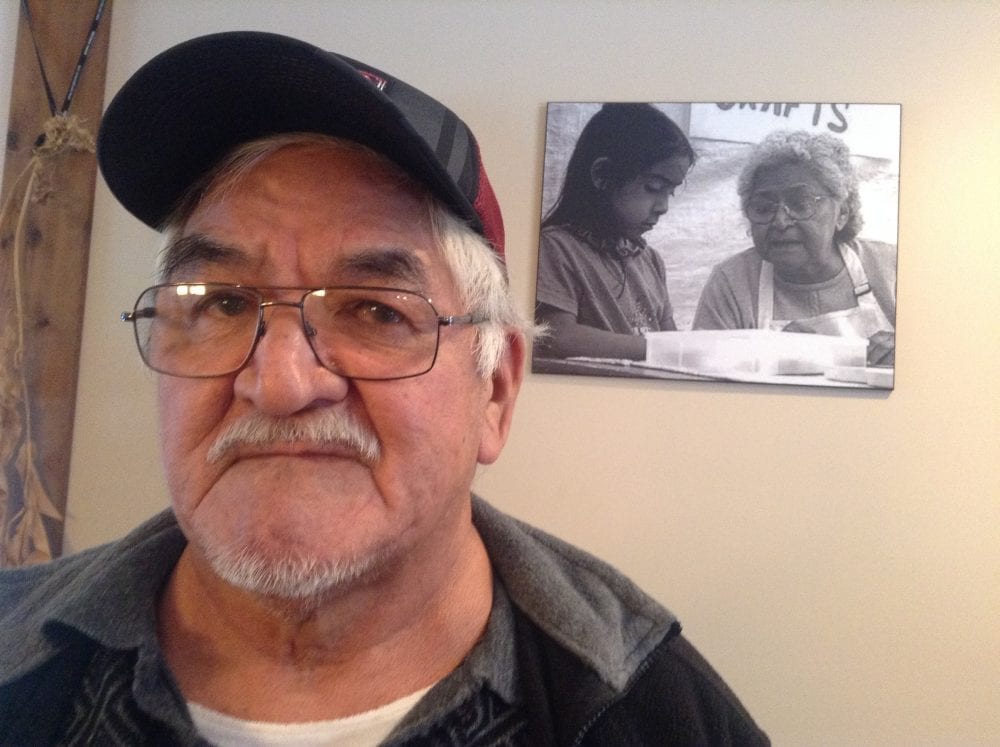
He’d also like to leave his land to his children, but before that can happen they have to be members first, otherwise, it could go back to the band.
As for Samantha Peters, she’s determined to keep the promise to her mom even if it means spending thousands of dollars of her own money to fight her band council in court.
“I have to do it,” she said. “This is what she wants me to do.”




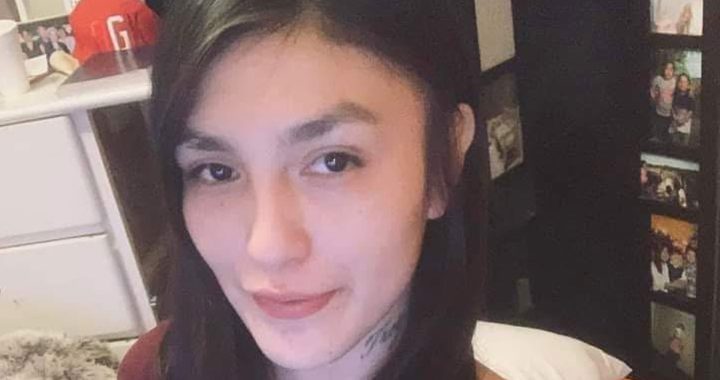
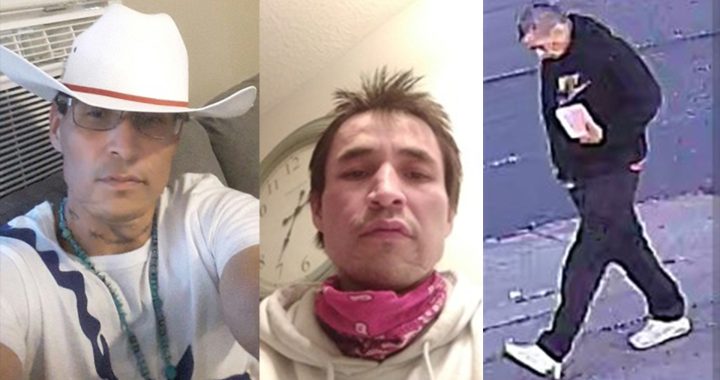
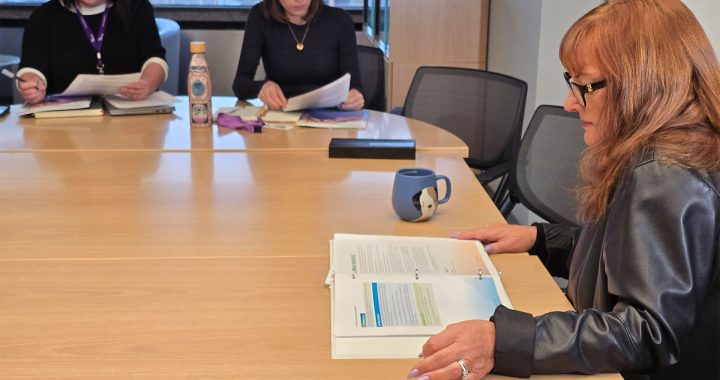
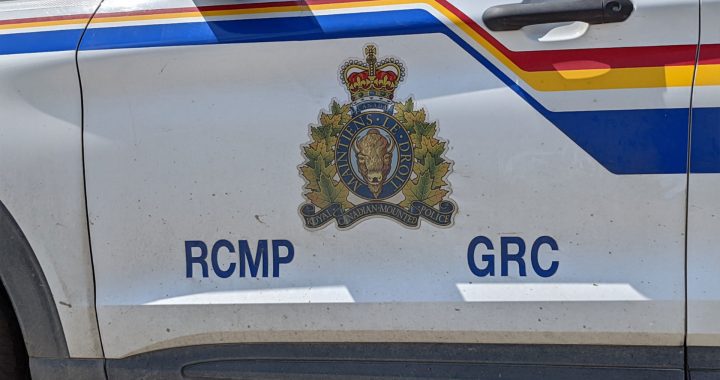
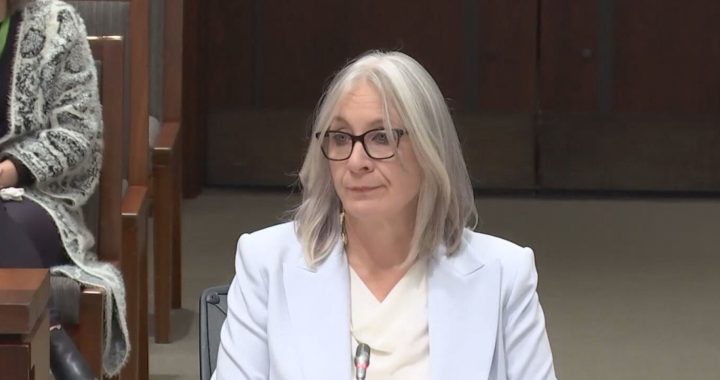
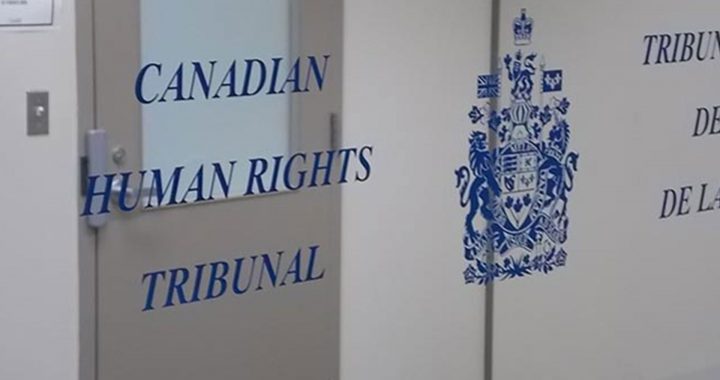
My grandfather was Oliver Peters of Peters Island he is buried there in the Peter’s reserve he died long before I was ever born my father was Donald Bob Peters , my father and his siblings were orphaned and ended up in Scowlitz. As it is right now I don’t know my Peters Family some history would be incredible to learn
Keep strong there Daryl and Sam. I’m very proud of you guys to finally open the doors to the nepotism, greed and corruption that’s happening on most First-Nation bands. There are not too many honest leaders out there anymore and that is totally sickening. How can one honestly cheat your own family and members out of what they deserve. I’ve been fighting this for years and it’s ongoing, just repetitive and agonizing.
Our band received millions of dollars for that pipeline and we had alot of Revenue, but where did it go. We got $2500 and the leaders get the rest. We had alot of Revenue $$ put away, they say, for years. But there’s nothing, no promised gas station or store nor campgrounds. All talk.
I’d like to see our tax $$ and Revenue $$ get sent out individually to band members, instead of one big cheque to administration which mysteriously goes into their accounts.
Way to go Daryl and Sam Peters, my hands up to yous. Keep strong.
WOW. . . .I can’t believe this is happening in this day and age. After decades of abuse by the government and others, this reserve is now continuing the abuse to its own people. To the Chief and Council of the Peters Reserve, you must accept these your relatives on to the membership of this reserve. Some are former members , some are children of current members. . . .they are all Peters YOUR COUSINS. . . .it’s fine to have self government but in this instance you are just afraid of losing control and that is not democracy.
Yes, I agree
The strength and courage of Samantha Peters to continue on with her grandmothers and mother’s dying wish to bring justice, equality and recognition for our extended Peters family is appreciated and we raise our hands to her and our fellow cousins. Over the past five years family had started to gather, initially to share our history and experiences with our Chief and Council. What started with a few of us grew to more than 20 meeting and further with emails, phone calls and facebook.
It has been Samantha that has been our ‘glue’ to keep us motivated, committed and believing that after 70 years change can happen! On behalf of the Lorenzetto Family who have been denied recognition for four generations now – we thank Samantha, her partner Darryl and family, as well as APTN reporter Kenneth and Cameraman Luke for taking the time, the effort and the willingness to listen, to report on this situation with many many issues. I am sure there are many other First Nation Bands across Canada experiencing this same shameful behaviour and we need to change that and INAC for their lack of support. INAC Vancouver has boxes of information, concerns and complaints from many of our Peters’ band families who have been denied any recognition from our band. I was told a few years back that the past retired INAC employee pasted on info to his replacement who said this is an old ongoing issue.. Never resolved……. 🙁
I had thought that I might feel remorse once this story got published. I do not.
Jackson has captured the realtime nuances of what it’s like to be a Peters family member.
As far as their ancestral ties to Peters Reserve are concerned, the families of Ed and Robert Peters are being extinguished as we speak, not to mention a number of others being completely shunned and disregarded, such as the families of Neil and Lee Peters, and others like Carol Raymond.
In my own first-hand experiences with Chief and Council: they had dozens of opportunities to say “yes” to their Cousins’ applications for Membership. They did not. The remorse is theirs to feel, not anyone else’s.
I would be remiss if I didn’t mention that we have a GoFundMe campaign, as well as a Facebook page, both under the name of Peters v. Peters, where you can access more info about the issues here on the Rez.
My hands go up to Kenneth Jackson and Luke Smith for deftly capturing our reality.
O Siyam.
Thank you for adding your insight. I hope that all those that are not members of this band soon gain legal member status.
I would like to contribute to a legal defence fund to assist this young woman fight for her people’s right. How can APTN or someone set this up or take donations for such a fund.
Hi Shirleen I am Guy Peters spouse you can go to the
GoFundMe Peters v. Peters to donate to help with legal defence, thank you for viewing this story we need to get it out there so people can see what kind of corrupt band this is….My hands go up to you for offering your help….:)